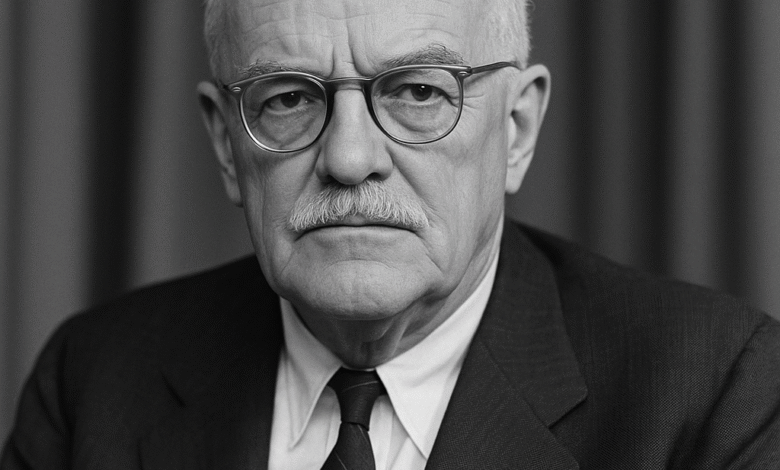Allen W. Dulles: The Legacy of the CIA’s Longest-Serving Director
Unveiling the Life, Career, and Impact of Allen W. Dulles on Modern Intelligence Operations

Allen W. Dulles was a pioneering figure in the history of U.S. intelligence, serving as the longest-serving Director of Central Intelligence (DCI) from 1953 to 1961. His tenure shaped the modern CIA and influenced covert operations that defined much of the Cold War era. Known for his strategic foresight and involvement in key global events, including the 1953 Iranian coup and the Bay of Pigs invasion, Dulles was a pivotal architect of U.S. foreign policy and intelligence activities. His legacy continues to spark debates about the ethical implications of intelligence operations, making him one of the most influential figures in intelligence history.
Introduction
Allen W. Dulles, the first civilian to hold the title of Director of Central Intelligence (DCI), remains one of the most significant figures in the history of the Central Intelligence Agency (CIA). Serving as the longest-serving DCI, from 1953 to 1961, Dulles oversaw pivotal covert operations and played a central role in shaping U.S. intelligence during the Cold War. His influence extended beyond the agency, leaving an indelible mark on global geopolitics. This article delves into the life, career, and lasting impact of Allen W. Dulles, shedding light on his major achievements, controversies, and the enduring legacy he left behind.
Early Life and Background of Allen W. Dulles
Born on April 7, 1893, in Watertown, New York, Allen Welsh Dulles came from a family steeped in public service. His father, Allen Macy Dulles, was a Presbyterian minister, and his mother, Edith Foster Dulles, was the daughter of former U.S. Secretary of State John W. Foster. This strong intellectual and public service background influenced Dulles’s worldview, fostering an early interest in international relations and diplomacy.
Dulles attended Princeton University, where he studied history and graduated in 1914. His education at Princeton laid the foundation for his future in diplomacy and intelligence work. After completing his undergraduate degree, Dulles went on to study law at George Washington University, which provided him with the legal expertise he would later use in his intelligence work.
Career Beginnings: A Diplomat and Lawyer
Before entering the world of espionage, Allen W. Dulles worked as a lawyer. His early legal career included a position with the prestigious law firm Sullivan & Cromwell. During this time, Dulles’s sharp legal mind caught the attention of the U.S. government, and he soon found himself serving in various diplomatic posts in Europe.
In 1916, Dulles began his career in the U.S. diplomatic service, working in various roles in Europe. He played key roles in diplomatic missions in countries such as Germany, Switzerland, and Austria. His exposure to European political dynamics during the tumultuous years of World War I and its aftermath proved instrumental in shaping his later career in intelligence.
The OSS and World War II
Dulles’s significant contributions to U.S. intelligence began during World War II. In 1942, Dulles was appointed head of the Office of Strategic Services (OSS) in Switzerland, the precursor to the CIA. His work in Switzerland during the war, especially his involvement in intelligence gathering in Nazi-occupied Europe, helped establish his reputation as a skilled intelligence operative.
One of Dulles’s key achievements during this time was his ability to build networks of informants and agents behind enemy lines. He was instrumental in coordinating the work of OSS agents in Europe and facilitated the collection of critical information on the movements of German and Italian forces. His work with the OSS laid the groundwork for the CIA’s future operations.
Founding the CIA and Becoming Director
After World War II, Dulles continued his intelligence work, and in 1947, when the CIA was formed, he became an essential figure in its creation. His deep understanding of global politics and intelligence operations made him an ideal candidate to help shape the new agency. Dulles was appointed the CIA’s first civilian director in 1953 by President Dwight D. Eisenhower.
Dulles’s appointment as DCI marked the beginning of a new era for the CIA, one that would focus heavily on covert operations and intelligence gathering on a global scale. His tenure saw the transformation of the agency from a fledgling institution into a powerful force in international intelligence.
Major Covert Operations Under Dulles
Dulles’s tenure as Director of Central Intelligence was marked by several significant covert operations that had far-reaching consequences. Two of the most notable and controversial operations were the 1953 Iranian coup and the 1954 Guatemalan coup. These operations, conducted with the aim of undermining governments deemed hostile to U.S. interests, are often cited as pivotal moments in Cold War history.
Operation Ajax (1953):
The CIA orchestrated a coup to overthrow Iran’s Prime Minister Mohammad Mossadegh after he nationalized Iran’s oil industry. The coup reinstalled the Shah of Iran, Mohammad Reza Pahlavi, who was more favorable to Western interests. The operation, though successful in the short term, sowed the seeds of anti-American sentiment in Iran, culminating in the 1979 Iranian Revolution.
Operation PBSUCCESS (1954):
In Guatemala, the CIA engineered the overthrow of President Jacobo Árbenz, whose left-leaning policies were viewed as a threat to U.S. corporate interests, particularly the United Fruit Company. The operation marked a significant moment in U.S. interventionism in Latin America and has been widely criticized for its long-term destabilizing effects in the region.
In addition to these, Dulles’s CIA was involved in numerous other operations aimed at countering the spread of communism and securing U.S. interests during the Cold War. His strategy of using covert action as a tool of U.S. foreign policy was a defining feature of his tenure.
Project MKUltra and Ethical Controversies
One of the most controversial aspects of Allen Dulles’s tenure at the CIA was his involvement in the secret mind control program known as MKUltra. This program, which began in the early 1950s, involved experiments on human subjects using drugs, including LSD, to explore the potential for mind control. The program was shrouded in secrecy and violated ethical guidelines, leading to lasting damage to the CIA’s reputation.
Dulles was deeply involved in the creation and execution of MKUltra, although he later distanced himself from the program when it was exposed in the 1970s. The revelations about MKUltra contributed to the growing distrust of the CIA and U.S. intelligence agencies, and it remains one of the darkest chapters in the history of American intelligence.
The Bay of Pigs Invasion and Dulles’s Downfall
Perhaps the most significant failure of Dulles’s career was the Bay of Pigs invasion in 1961. The operation, which aimed to overthrow Cuban leader Fidel Castro, was a disaster for the CIA and the U.S. government. The invasion was poorly executed, and the Cuban forces easily repelled the U.S.-backed exile brigade. The failure was a major blow to Dulles’s reputation and led to his dismissal from his position as DCI by President John F. Kennedy.
The Bay of Pigs incident exposed flaws in U.S. intelligence and covert operations, prompting a re-evaluation of the CIA’s methods and strategies. Despite his dismissal, Dulles remained active in public life and served on the Warren Commission, which investigated the assassination of President Kennedy.
Legacy and Impact on U.S. Intelligence
Although Dulles’s career was marred by some controversies, his impact on U.S. intelligence is undeniable. As DCI, Dulles transformed the CIA into a formidable force for global intelligence operations, laying the groundwork for the agency’s future success. His use of covert operations as a tool of foreign policy and his emphasis on intelligence gathering during the Cold War had far-reaching consequences for global geopolitics.
Despite the controversies surrounding his tenure, including his role in the Iranian coup, the Guatemalan coup, and MKUltra, Dulles’s legacy as a leader in U.S. intelligence remains significant. His contributions to the development of the CIA and his strategic vision shaped the course of the Cold War and continue to influence intelligence practices to this day.
Conclusion
Allen W. Dulles was a man of great influence whose career spanned some of the most pivotal moments in modern history. As the longest-serving Director of Central Intelligence, he shaped the CIA into a powerful force in global intelligence, leaving behind a legacy that continues to be studied and debated. His involvement in covert operations, as well as his controversial decisions, have made him a complex and often polarizing figure. Nonetheless, Allen W. Dulles’s contributions to U.S. intelligence are undeniable, and his influence remains felt in the world of espionage and international relations.



